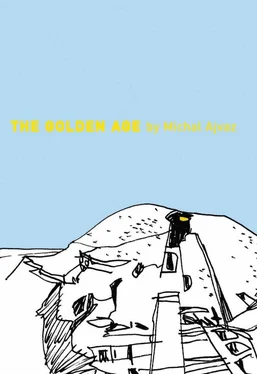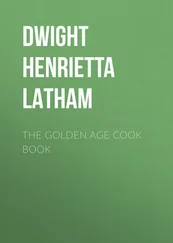Michal Ajvaz - The Golden Age
Здесь есть возможность читать онлайн «Michal Ajvaz - The Golden Age» весь текст электронной книги совершенно бесплатно (целиком полную версию без сокращений). В некоторых случаях можно слушать аудио, скачать через торрент в формате fb2 и присутствует краткое содержание. Год выпуска: 2010, Издательство: Dalkey Archive Press, Жанр: Современная проза, на английском языке. Описание произведения, (предисловие) а так же отзывы посетителей доступны на портале библиотеки ЛибКат.
- Название:The Golden Age
- Автор:
- Издательство:Dalkey Archive Press
- Жанр:
- Год:2010
- ISBN:нет данных
- Рейтинг книги:4 / 5. Голосов: 1
-
Избранное:Добавить в избранное
- Отзывы:
-
Ваша оценка:
- 80
- 1
- 2
- 3
- 4
- 5
The Golden Age: краткое содержание, описание и аннотация
Предлагаем к чтению аннотацию, описание, краткое содержание или предисловие (зависит от того, что написал сам автор книги «The Golden Age»). Если вы не нашли необходимую информацию о книге — напишите в комментариях, мы постараемся отыскать её.
is Michal Ajvaz’s greatest and most ambitious work.
The Golden Age
The Golden Age — читать онлайн бесплатно полную книгу (весь текст) целиком
Ниже представлен текст книги, разбитый по страницам. Система сохранения места последней прочитанной страницы, позволяет с удобством читать онлайн бесплатно книгу «The Golden Age», без необходимости каждый раз заново искать на чём Вы остановились. Поставьте закладку, и сможете в любой момент перейти на страницу, на которой закончили чтение.
Интервал:
Закладка:
I have mentioned already that the inhabitants of the island did not call it by any name. They did not like fixed names and changed their own with great frequency; in the course of his life, each islander had dozens of names. A new name might come into being by the bearer’s accepting a corrupted pronunciation he had heard somewhere of the name by which he had gone up to that point, or he might adopt a name by which someone addressed him in error. At the same time the islanders understood names as things which established a certain dialogue with the things they designated. Names were saturated with the qualities of things, but they also worked on these things and transformed them. In this dialogue both names and things matured, underwent change and perished. Some people might think it strange that while on the one hand the islanders conceded so much power to the name, on the other they could quite light-mindedly accept as their own a name which had come into being by chance. But the inhabitants of the island believed that it was precisely names with their origins in errors, slips of the tongue or mishearings which in their dialogue with things had the power to surprise — that it was these names which embedded themselves in their unprotected side, from where their most interesting voice was wrung.
Whenever an islander accepted a name, he tended to adjust his behaviour so that it corresponded to the new name. Islanders also went through periods when they lived without a name. I believe that in the past the island, too, had various names, and it will surely have a great many names in the future, but my time there coincided with a time when the last name had expired and the next had not yet come into being. The islanders would forget the island’s past names, just as they forgot the names they themselves had had in childhood and youth. I, too, had several names while I was on the island and I, too, have forgotten what they were, with one exception; this was a word which in their language designated a bird similar to a pelican, and perhaps I got it because my European name was similar to this word. In the time that this word was my name, I came to recognize in myself certain qualities I shared with the bird; already I was so steeped in the mores of the island that I caught myself imitating its strange walk and the timbre of its voice. Was it the name which had imposed these traits upon me or were they already present within me, waiting for discovery and restoration by the new name? But as others never gave a thought to such things, nor did I agonize over them.
Murmurs and lights
In the slim volume from the antiquarian bookseller’s in Munich I read that the ancestors of today’s islanders built the upper town on the river where the rock drops sharply and the river frays into a maze of strands, and that they did so because water is in short supply for much of the year and to protect themselves from the pirates who once plundered the coast with great regularity. I believe that these factors may indeed have played a part in the founding of the town as it was; but the main reason for the islanders’ remaining in this inhospitable, barren place is their liking for the soft water music that forever accompanies life in the upper town, just as in the streets and apartments of the lower town they like to hear the steady ripple of the sea. The islanders did not drink alcohol or use drugs (with one exception, of which I shall speak later), but their love of rustling and other quiet sounds, sounds which we rarely perceive, had something in common with an addiction to drugs: they were able to listen all day long to the rush of the sea or the sound of the wind through a crack in a wall.
The upper town is built into a waterfall. The roaring masses of water and the rapid, wild, swirling currents are impossible to imagine. Formations of rock divide the current flowing from the lake above the town into many strands, and these zigzag down the rock-face, beating into the shelf, dividing as they go into ever more strands. In the lower part of the town they begin to come together until they become a single stream again on reaching the coastal flats. In this way the river creates in the upper town a kind of double delta. The river’s current is not particularly strong even in the rainy season. On the area of the upper town it is divided into so many weak strands that the water passing through the town only whispers in trickles, drips, rustles and ripples. At the beginning of my stay in the upper town all the sounds came to me as one, an indistinguishable murmur, but with time I learned to tell them apart — the sound of water flowing down the rock-face and the stone steps, the sounds of water columns and walls of water, fountains and individual drops falling on stone and on the surface of water. The monotonous murmur was transformed as if by magic into a musical composition played on a great variety of instruments by a full orchestra, a symphony without end whose movements traced out subtle differences in style, gave expression to the whole scale of moods and feelings of the phantom composer; it seemed to me that I could even hear in it various philosophical notions. This water composition was of varying quality: sometimes it came up with quite unexpected chords and original moves, at others it tended to repeat already familiar combinations of notes, yet never did it lapse into the banality and sentimentality saturating so many famous compositions from Europe. (When on the island I sometimes imagined an inverse world, in which concert halls would be turned over to the sounds of rain and the rustling of winds while in the treetops and on the weirs and behind the walls of factories, sonatas and symphonies would ring out; in a world such as this the damp on the plastering of walls would probably form coherent text while the pages of books would be covered with indistinct marks.)
The houses of the upper town are built on islands of rock among the branching currents. At their rear the houses are attached to the rock. The river splits into two above the roof of a house, and these two arms flow around it before dividing themselves up further; some of the new arms are drawn away before joining a stream grown out of other currents, while others come together again beneath the house, creating a circle of water around it. Sometimes the occupiers admit an arm of the river into their house, where it continues to fray. To begin with I thought they did this so the current could be put to work in rooms hidden somewhere in the house, but the islanders would likely grow indignant at such single-minded exploitation of this element whose quiet power they esteem so highly; they take simple delight in the coolness of the water and the sounds it makes, and sometimes they put drops of dye in it and watch the figures change and melt. (The islanders sometimes put me in mind of the Japanese, though the former differ from the latter in that they feel absolutely no need to create objects of beauty.)
The occupiers of many of the houses directed the water across the roof so that as it tumbled over the edge it became a lustrous curtain of water made up of several columns, in which threads of sunlight created the perfect illusion of sparkling beads of coral or a solid wall of water. (It may be that this feature of the island’s architecture inspired Frank Lloyd Wright to design his unrealized house in the Arizona desert with its wall of water.) Naturally it was a simple matter to pass through such a wall of water, meaning that any intruder who chose to enter the house would be obstructed by nothing more than a brief dousing. But there was no thievery and murder on the island. Although morality and humaneness meant nothing to the islanders, they were strangers, too, to egoism, and they were too dreamy and lazy to do evil.
On the island I had a girlfriend. I shall refer to her as Karael, as this was her name at the time we first met. In her house, too, the bedroom was separated from the outside world by a murmuring wall of water. When at night I was unable to sleep, I would watch the wall shining magically in the moonlight and listen to the trickling of the water until sleep reclaimed me. Or I would watch the wall from the room as the sun was setting, when it seemed that the wall was composed of a liquid crimson glow. These moments of the day and night were for me the pinnacle of happiness: I would forget about Europe and all I still wanted to do there, about the stories and articles I was working on, about my friends and the countries I wanted to visit. I would forget, too, my constant objections to the islanders’ way of life, which consisted of nothing more than bathing lazily in their perfect, unvarnished sense of the absolute, in the sea of bliss composed of lights and murmurs before these degenerated into shapes and words. And I would ask how I could wish for something other than this clear light, than this splendid, idle glow of the present.
Читать дальшеИнтервал:
Закладка:
Похожие книги на «The Golden Age»
Представляем Вашему вниманию похожие книги на «The Golden Age» списком для выбора. Мы отобрали схожую по названию и смыслу литературу в надежде предоставить читателям больше вариантов отыскать новые, интересные, ещё непрочитанные произведения.
Обсуждение, отзывы о книге «The Golden Age» и просто собственные мнения читателей. Оставьте ваши комментарии, напишите, что Вы думаете о произведении, его смысле или главных героях. Укажите что конкретно понравилось, а что нет, и почему Вы так считаете.












